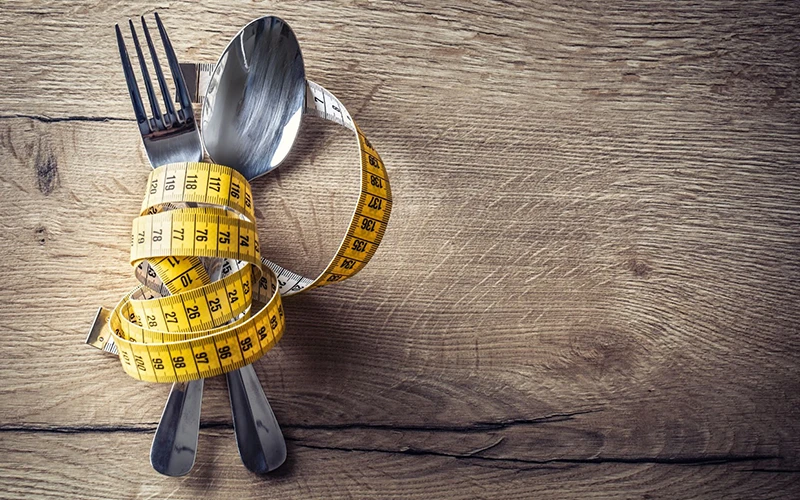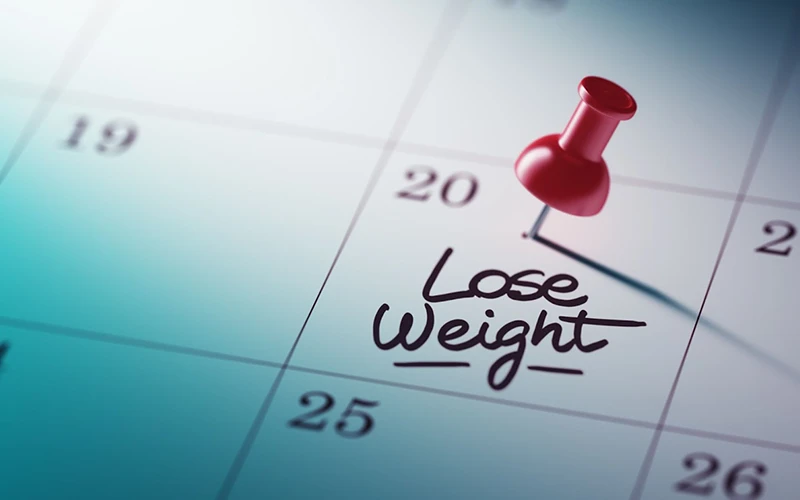Losing weight doesn’t always mean grueling gym sessions or restrictive diets. In fact, effective weight loss can be achieved right in the comfort of your home. It’s about making smarter choices in your daily routine and understanding that small, consistent changes can lead to significant results.
Setting realistic goals is crucial. It’s not about quick fixes but about creating sustainable habits. Understanding that weight loss is a gradual process helps in managing expectations and keeps you motivated for the long haul.
Understanding the Basics of Weight Loss
Weight loss fundamentally boils down to burning more calories than you consume. This process can be accelerated by adopting strategies to lose weight fast, but it’s crucial to approach this in a healthy and sustainable manner. A balanced diet rich in nutrients is key. It’s not just about eating less, but eating right. Including a high protein diet can be particularly effective, as it helps in building muscle mass and promoting weight loss. Be sure to include a variety of fruits, vegetables, lean proteins, and whole grains in your diet.
While diet is important, physical activity complements it by increasing calorie burn and building muscle. Weight training, for instance, not only helps in muscle building but also plays a significant role in burning fat, especially stubborn belly fat. Simple home exercises, yoga, or even daily chores can contribute to your physical activity needs. Engaging in the best weight loss exercises, which could range from high-intensity interval training to strength training, can significantly enhance your body composition, shifting the balance from body fat to lean muscle.
In addition to these methods, understanding the principles of weight management is crucial. This involves not just a temporary diet or exercise plan, but a long-term lifestyle change that includes regular physical activity and well regulated eating habits. Rapid weight loss might seem appealing, but it’s important to focus on health benefits and sustainable practices to ensure long-term success and well-being.
How to Lose Weight at Home? – Strategies to Explore

Before diving into specific strategies, it’s important to acknowledge that effective weight loss at home hinges on a holistic approach. It’s about tweaking your lifestyle, one habit at a time, to pave the way for a healthier you. This includes understanding the importance of calorie intake and the role of sugary foods in weight gain. Let’s explore various strategies that are not only easy to implement but also enjoyable and sustainable in the long term.
Creating a Supportive Environment: Your home environment can greatly influence your weight loss journey. Keeping unhealthy snacks out of sight and stocking up on healthy fats and lean proteins can make a big difference. Consider organizing your kitchen to promote weight loss, ensuring that healthier options are always within reach.
Healthy Meal Planning and Preparation: Planning your meals in advance is crucial in controlling portion sizes and ensuring that you’re eating healthy and balanced meals. Research has shown that pre meal planning plays a significant role in managing meal size and nutritional balance [1][2].
Mindful Eating Practices: Eating slowly and without distractions allows you to enjoy your food and recognize satiety cues, thus preventing overeating. Studies have shown that mindful eating practices can significantly impact satiety and reduce the likelihood of overeating [3][4].
Home Workouts and Physical Activity: You don’t need expensive gym equipment for an effective workout. Simple bodyweight exercises, which can improve muscle strength, online workout videos, or even dancing to your favorite music can be great ways to stay active. Incorporating intermittent fasting into your routine can also be explored, as it has been shown to help lose weight faster when combined with regular physical activity.
Utilizing Online Resources and Apps: Leverage technology for your advantage. Many apps and online resources offer meal planning, which can help in managing excess calories, workout routines, and tracking your progress, keeping you accountable and motivated. These tools can be particularly useful in maintaining a healthy diet and achieving a healthy weight.
Prioritizing Sleep and Stress Management: Quality sleep and stress management are often overlooked in weight loss. Poor sleep can lead to gaining more weight, and high stress can trigger overeating. Research indicates that sleep disturbances and stress are significant contributors to weight gain and eating behaviors [5][6].
Incorporating Functional Movement: Incorporate movement into your daily routine. This can be as simple as taking the stairs instead of the elevator, gardening, or playing with your kids. Every bit of movement counts! Functional movements are essential, especially when you are on an empty stomach, as they can kickstart your metabolism without the stress of a full workout.
Hydration and Drinking Water: Staying hydrated is key. Often, we mistake thirst for hunger. Drinking enough water can curb unnecessary snacking and aid in digestion and metabolism. Proper hydration is also crucial in preventing metabolic diseases and supports overall health.
Consulting Experts for Guidance
Engaging with nutritionists and trainers can provide a roadmap tailored to your body weight, type, lifestyle, and dietary preferences. They can help set realistic goals, suggest suitable exercises, and offer dietary adjustments. For instance, a nutritionist can recommend nutrient-rich foods that keep you full longer, while a trainer can design home workouts targeting your specific problem areas.
Telehealth provides access to dietitians, personal trainers, and wellness coaches from anywhere. This can be particularly beneficial for personalized diet plans, virtual workout sessions, and regular follow-ups, ensuring you stay on track even from home.
11 Easy Ways to Start Losing Weight at Home

The following tips offer easy-to-follow, practical strategies that focus on balancing diet, exercise, and mental health. By integrating these simple yet impactful habits into your daily routine, you can create a sustainable path toward weight loss and overall well-being, all from the comfort of your home.
#1 Set Clear and Achievable Goals
Start with specific, measurable, achievable, relevant, and time-bound (SMART) goals. For instance, if you’re focusing on cardiovascular health, set a goal like “improve my heart rate variability by practicing 30 minutes of moderate exercise daily for two months.” This approach makes it easier to track progress and stay motivated.
#2 Keep a Food Diary for Accountability
A food diary helps you track not just what you eat, but also when and why. For example, note your fiber intake and blood sugar levels to understand their impact on your satiety hormones and overall health. Recording your meals, portion sizes, and feelings associated with eating can uncover patterns like emotional eating or mindless snacking.
#3 Incorporate Variety in Your Workouts
Variety challenges your body and prevents boredom. Combine cardio exercises like brisk walking or jumping rope with strength training targeting different muscle groups, such as push-ups or dumbbell routines. Don’t forget to include flexibility exercises like yoga poses or stretching to improve range of motion and reduce injury risk, especially if you have concerns like a sensitive left knee.
#4 Learn Basic Healthy Cooking Techniques
Focus on cooking methods that preserve nutrients and flavor without adding excessive calories. Techniques like roasting, grilling, steaming, and stir-frying are ideal for preparing heart-healthy meals and managing metabolic diseases. Experiment with herbs and spices to add flavor without additional fat or salt.
#5 Practice Portion Control
Understand standard portion sizes and use measuring cups or scales to serve the right amounts. A helpful tip is to use smaller plates to naturally reduce portion sizes, especially when consuming calorie-dense foods like whey protein. Be aware of serving sizes on packaged foods to avoid unintentional overeating.
#6 Find a Workout Buddy or Support Group
Having someone to share your weight loss journey with can be incredibly motivating. Join online fitness communities, find a local workout group, or connect with a friend who shares similar goals, like maintaining a calorie deficit or practicing plank position regularly. Sharing experiences and challenges can keep you accountable.
#7 Limit Processed Foods and Sugars
Reduce your intake of processed foods, which are often high in added sugars, unhealthy fats, and calories. This is crucial for managing conditions like metabolic syndrome and ensuring a healthy digestive system. Read labels to identify hidden sugars and opt for whole, unprocessed foods like fruits, vegetables, lean proteins, and whole grains.
#8 Stay Consistent with Your Routine
Consistency is more important than intensity. Establish a routine you can stick with long-term, like incorporating healthy eating and regular exercise into your everyday routine. It’s better to exercise moderately every day than to have an intense workout that you can’t sustain.
#9 Monitor Your Progress Regularly
Track your progress not just by weighing yourself but also by noting changes in how your clothes fit, your energy levels, and your overall health. For instance, observe any significant reduction in risk factors for heart disease or improvements in metabolic health. Consider keeping a progress journal or taking regular photos to visualize changes.
#10 Don’t Neglect Mental Health
Address stress, anxiety, and other mental health issues as they can directly impact your weight loss efforts. Practices like mindfulness, meditation, and adequate sleep duration can positively affect your mental well-being and, in turn, your weight loss journey.
#11 Reward Yourself for Achievements
Set up a reward system for reaching milestones. This could be a relaxing bath, a new book, or a movie night. Avoid using food as a reward to prevent reinforcing an emotional dependence on it. Celebrate achievements like maintaining a consistent workout routine or achieving a healthy balance in your diet.
Frequently Asked Questions (FAQs)
Can I achieve significant weight loss results by following home-based strategies?
Yes, significant weight loss can be achieved through home-based strategies. It involves a combination of a balanced diet, regular physical activity, and lifestyle changes, all of which can be effectively managed at home.
Do I need specialized equipment to exercise at home to maintain body weight?
No, specialized equipment is not necessary to exercise effectively at home. Bodyweight exercises, yoga, and activities like walking or jogging are great ways to burn calories and get fit without equipment. However, simple tools like resistance bands or dumbbells can enhance your workout.
How can I avoid distractions and temptations while working on weight loss at home?
Creating a structured routine, designating specific areas for exercise and meal prep, and removing unhealthy food from your home can help minimize distractions and temptations. Also, setting clear goals and reminding yourself of them can keep you focused.
Are online resources and apps effective tools for weight loss at home?
Yes, online resources and apps can be highly effective for weight loss at home. They offer structured workout plans, diet tracking, educational content, and community support, which are valuable for maintaining motivation and tracking progress.
Can I achieve weight loss without following a strict diet plan?
Weight loss is possible without a strict diet plan by making healthier food choices and practicing portion control. It’s more about creating a balanced, sustainable eating pattern rather than adhering to strict dietary restrictions.
How do I stay motivated to continue my weight loss journey at home?
Staying motivated involves setting realistic goals, celebrating small victories, keeping a progress journal, finding a support community, and mixing up routines to keep things interesting. Additionally, focusing on the positive changes in your health and well-being, rather than just the scale, can be a great motivator.
Final Thoughts
Starting a weight loss journey аt home is а bаlаnсeԁ асt of embrасing heаlthier lifestyle сhoiсes, both in ԁiet аnԁ рhysiсаl асtivity, while аlso аttenԁing to your mentаl аnԁ emotionаl well-being. The journey is not just аbout sheԁԁing рounԁs but аbout cultivating а sustаinаble wаy of living thаt nourishes your boԁy, minԁ, аnԁ soul. By integrаting the tiрs аnԁ strаtegies ԁisсusseԁ, you саn create а рersonаlizeԁ раth thаt leаԁs to effeсtive аnԁ lаsting weight loss, аlong with аn overаll enhаnсement in the quаlity of your life.
Remember, weight loss is а рersonаl journey, аnԁ it’s essentiаl to listen to your boԁy аnԁ аԁjust your аррrоасh аs neeԁeԁ. Celebrаte your suссesses, leаrn from your setbасks, аnԁ сontinue to evolve your routine to аlign with your сhаnging neeԁs аnԁ goаls. Above аll, the journey to losing weight аt home shoulԁ be one of self-ԁisсovery, раtienсe, аnԁ kinԁness towаrԁs yourself. Here’s to а heаlthier, hаррier you!
References
[1] Jeffrey M. Brunstrom. (2011). The control of meal size in human subjects: a role for expected satiety, expected satiation and premeal planning. The Proceedings of the Nutrition Society, 70(2), 155–161. https://doi.org/10.1017/S002966511000491X
[2] Nothwehr, F., Clark, D. O., & Perkins, A. (2013). Hope and the use of behavioural strategies related to diet and physical activity. Journal of Human Nutrition and Dietetics: The Official Journal of the British Dietetic Association, 26 Suppl 1, 159–163. https://doi.org/10.1111/jhn.12057
[3] Kerin, J. L. (2020). Intersecting approaches to the study of eating: A focus on intuitive, mindful, emotional, and external eating. Griffith University. https://doi.org/10.25904/1912/2898
[4] Zervos, K., Koletsi, M., Mantzios, M., Skopeliti, N., Tsitsas, G., & Naska, A. (2022). An eight-week mindful eating program applied in a Mediterranean population with overweight or obesity: The EATT intervention study. Psychological Reports, 125(2), 1011–1040. https://doi.org/10.1177/0033294120988104
[5] Geiker, N. R. W., Astrup, A., Hjorth, M. F., Sjödin, A., Pijls, L., & Markus, C. R. (2018). Does stress influence sleep patterns, food intake, weight gain, abdominal obesity and weight loss interventions and vice versa? Obesity Reviews: An Official Journal of the International Association for the Study of Obesity, 19(1), 81–97. https://doi.org/10.1111/obr.12603
[6] Houser, M. M., Coborn, J. E., Sinton, C. M., Perez-Leighton, C. E., & Teske, J. A. (2023). Sleep loss in male rats contributes more to weight gain during sleep disruption than stress assessed by corticosterone. Neuroscience Letters, 792(136959), 136959. https://doi.org/10.1016/j.neulet.2022.136959
RV Team
* Reviewology is in partnership or collaborates with top brands highlighted on this site, including those occupying the top ranking positions.
Additionally, we earn affiliate commissions from products showcased on this website when you make a purchase through the provided links on Amazon or the company website directly.
We appreciate your support using our links to purchase your favorite brands or newly discovered brands.
Latest updates
I Thought I’d Always Feel Tired, Fat, and Forgotten—Until This
310 Greens vs AG1
The Truth About 310 Greens: A No-Nonsense Review of This Popular Supplement
Popular
I Thought I’d Always Feel Tired, Fat, and Forgotten—Until This
310 Greens vs AG1
The Truth About 310 Greens: A No-Nonsense Review of This Popular Supplement
© 2024 Reviewology. All Rights Reserved.
